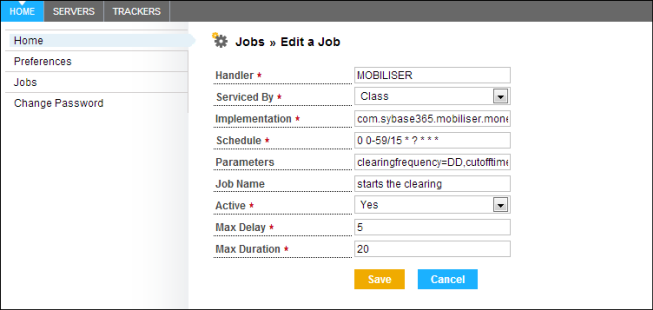The Jobs option lets you schedule background jobs to run at certain times using the cron utility. For example, you can schedule a job to run at midnight to transfer commissions to the individual partners. You can also schedule a job to run every five minutes to generate new invoices. A cron daemon can retrieve jobs regularly from a database using the job handler name. The task makes sure that each job does not run in parallel multiple times, cancels jobs that are not responding, and synchronizes job execution across Java Virtual Machines (JVMs).
| Field | Description |
|---|---|
| Handler | Defines the cron daemon that handles the task. The handler corresponds to a defined value in the database. The default handler is MOBILISER. You can enter multiple handlers separated by commas (MOBILISER, MOBILISER1, and so on). |
| Serviced By | Service filter for the job: Class or Bean. |
| Implementation | Defines the service filter.
|
| Schedule | Defines the job schedule in a cron format. For example, 0 0/5 * ? * * * defines a cron daemon that runs every 5 minutes. The default expression is 0 0/1 * * * ?, which runs every minute. |
| Parameters | Parameters that the job handler requires for job processing. Parameters can be any string that depends on the expected result of the job. |
| Job Name | Job description. |
| Active | Defines whether the job is active or inactive. |
| Max Delay | Maximum number of minutes after the scheduled time that starting the job can be delayed. If the maximum delay is exceeded, the job is not started. |
| Max Duration | Maximum duration in minutes that the job runs. If the maximum duration time is exceeded, the job is cancelled and marked "failed." |
